
By: Christina Nguyen, Technical Market Manager
Why Stress?
Most people can agree that 2020 was a particularly stressful year. Everyone experiences stress to some degree and you certainly know when you feel it, but exactly what is stress? Stress is a biological reaction, both mental and physical, to situations that are challenging or potentially harmful, whether the threat is real or perceived. It is a normal reaction; in fact, our bodies evolved to experience stress because it can be beneficial for escaping a dangerous situation.
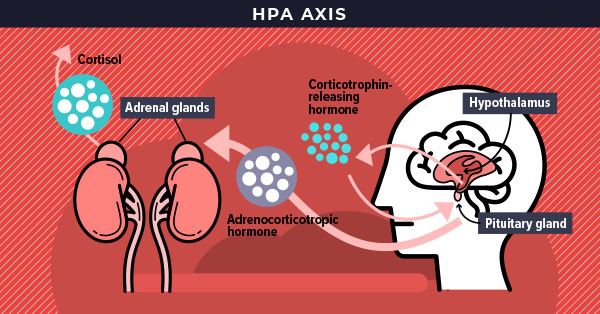 A threat triggers the autonomic nervous system and hypothalamic-e-adrenal (HPA) axis, leading to a fight or flight response, where your heart rate and blood pressure increase, breathing becomes more rapid, your body tenses.1 Your body is preparing for action by increasing the supply of energy and oxygen and redirecting blood flow to your muscles. This is actually beneficial during short-term, life-threatening situations because you are physically prepared to fight or run, increasing your chance of survival.
A threat triggers the autonomic nervous system and hypothalamic-e-adrenal (HPA) axis, leading to a fight or flight response, where your heart rate and blood pressure increase, breathing becomes more rapid, your body tenses.1 Your body is preparing for action by increasing the supply of energy and oxygen and redirecting blood flow to your muscles. This is actually beneficial during short-term, life-threatening situations because you are physically prepared to fight or run, increasing your chance of survival.
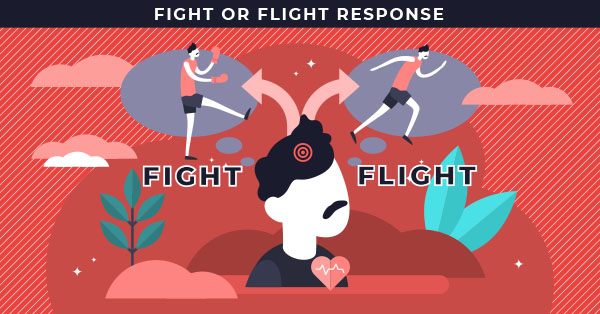 While this is helpful when dealing with a mountain lion or mugger, it is decidedly less helpful when dealing with many modern situations. Nowadays, stressful situations tend to be less often of the short-term physical type, but instead they tend to be longer term psychological and emotional situations such as work or financial stress. Long-term, or chronic, stress has many detrimental effects on the body.1,2
While this is helpful when dealing with a mountain lion or mugger, it is decidedly less helpful when dealing with many modern situations. Nowadays, stressful situations tend to be less often of the short-term physical type, but instead they tend to be longer term psychological and emotional situations such as work or financial stress. Long-term, or chronic, stress has many detrimental effects on the body.1,2
Consequences of Long-Term Stress
While increases in blood pressure and heart rate may be helpful in an immediate stressful situation, long-term elevation causes changes that over time may trigger conditions like atherosclerosis, which can, in turn, contribute to strokes and heart attacks.1 Stress also can cause an imbalance of neural circuitry, changing levels of neurotransmitters and hormones, which leads to changes in cognition and behaviour in addition to further changes in physiological systems.2 A good example is the immune system. Short-term stress activates a heightened immune response, but exposure to the same stress over several weeks actually results in suppression of the immune system.2 This is only a small glimpse into the effects of long-term stress, but clearly, it is not good for you.
Don’t Worry, Be Happy!
People often say, ‘just relax’ or ‘don’t stress,’ but that is easier said than done. Stress seems to be an inescapable part of life, whether it’s worrying about finances, work, relationships… the list goes on and on. The American Psychological Association released a publication in February 2021 that revealed 84% of adults reported in the last two weeks they felt at least one emotion associated with prolonged stress, most commonly anxiety, sadness and anger.3 The average stress level reported was 5.6 (out of 10), a higher level than the last survey in April 2020.3 It’s best to try and minimise stressful situations, but since not all situations can be avoided, proper stress management is vital. There is a lot of advice on how to ‘destress’ out there, ranging from meditation to essential oils, but which methods are actually effective? Let’s take a look at a few techniques that have science to back them up.
1) Physical Activity ideally for 30 minutes 3-5 times a week, but you can break up the 30 minutes into 10-minute segments if that helps. A study showed that participants who exercised for 30 minutes on their lunch break during weekdays experienced significant reductions in the levels of stress they perceived after only 5 weeks.4 Regular physical activity also provides a myriad of other health benefits.
2) Mindfulness or Meditation of any type has been shown to lower stress in addition to providing other benefits like reducing blood pressure.5 For those of us who don’t like to sit, moving meditation such as walking, swimming, yoga or qigong work well too!
3) Diaphragmatic Breathing (slow and deep breathing) helps reduce stress and can help improve quality of life by positively affecting hypertension, migraine, anxiety and even chronic constipation.6
4) Healthy and Balanced Diet is part of a good lifestyle, but many don’t realise that what we do (or don’t) eat can impact stress levels. Insufficient levels of certain nutrients, particularly B vitamins, can contribute to stress and negative moods.7 In fact, being stressed may make your B vitamin requirements go up, by elevating your metabolism or affecting absorption. B vitamin supplementation has been shown to have a significant effect on reducing stress levels, particularly in those who already have a poor nutrient status.7 Antioxidants, for example, vitamins C and E, are also important for providing your cells protection against oxidative stress from damaging free radicals. One study observed that patients with depression had significantly lower levels of vitamins A, C, and E when compared to healthy controls.8 After 6 weeks of supplementing these vitamins, there were significant reductions in anxiety and depression scores along with significant increases in blood levels of antioxidants.8 Low magnesium status has been associated with anxiety and stress, leading to suggestions that magnesium supplementation may help alleviate feelings of anxiety.9
5) Being in Nature reduces stress and makes us feel happier.10 Time spent outdoors can have positive impacts on blood pressure, heart rate and attenuate HPA axis activation.10 Try combining physical activity and nature by going for a walk or run outdoors.
6) Social Support has a positive influence on health and longevity, partly because strong social support acts as a “stress buffer.”11 Having good social connections can lessen the activation of the autonomic nervous system and HPA axis, leading to a lower stress response.11 This is obviously much harder with stay-at-home orders in place, but even talking on the phone or through video calls can help. Our pets count as social support too!
It has been an exceptionally stressful time for much of the world, a situation that has been unavoidable for many. Next time you’re feeling overwhelmed, try one or more of the coping techniques listed that have science to back them up. Long-term stress is detrimental to both our physical and mental health, so while we may not be able to eliminate stress, we need to manage it effectively in order to protect our health and happiness.
NeoLife Product Solutions
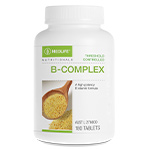 B-Complex Threshold Controlled – For sustained release of nutrients with the perfect balance of all eight B vitamins, plus inositol and choline.*
B-Complex Threshold Controlled – For sustained release of nutrients with the perfect balance of all eight B vitamins, plus inositol and choline.*
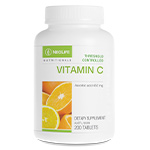 Vitamin C Threshold Controlled – Power of eight oranges in each tablet. Sustained-release delivery system assures optimal nutrient level protection for up to eight hours.*
Vitamin C Threshold Controlled – Power of eight oranges in each tablet. Sustained-release delivery system assures optimal nutrient level protection for up to eight hours.*
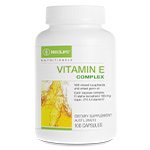 Vitamin E Complex – Whole food sourced natural vitamin E is full spectrum. Breakthrough water-miscible technology improves absorption.*
Vitamin E Complex – Whole food sourced natural vitamin E is full spectrum. Breakthrough water-miscible technology improves absorption.*
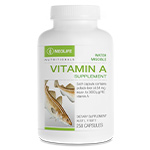 Vitamin A – Nature’s finest source – Pure Pollack liver oil. Water miscible to support easy absorption.*
Vitamin A – Nature’s finest source – Pure Pollack liver oil. Water miscible to support easy absorption.*
References:
1. McEwen BS. Physiology and neurobiology of stress and adaptation: Central role of the brain. Physiol Rev. 2007;87(3):873-904.
2. McEwen BS. Neurobiological and systematic effects of chronic stress. Chronic Stress. 2018;1:2470547017692328.
3. APA: U.S. Adults Report Highest Stress Levels Since Early Days of the COVID-19 Pandemic. American Psychological Association. February 2, 2021. Accessed March 5, 2021. https://www.apa.org/news/press/releases/2021/02/adults-stress-pandemic.
4. Diaz-Silveira C, et al. Mindfulness versus physical exercise: Effects of two recovery strategies on mental health, stress and immunoglobulin A during lunch breaks. A randomized conrolled trial. Int J Environm Res Public Health. 2020;17(8):2839.
5. Bostock S, et al. Mindfulness on-the-go: Effects of a mindfulness meditation app on work stress and well-being. J Occup Health Psychol. 2019;24(1):127-38.
6. Hamasaki H. Effects of diaphragmatic breathing on health: A narrative review. Medicines (Basel). 2020;7(10):65.
7. Young LM, et al. A systematic review and meta-analysis of B vitamin supplementation on depressive symptoms, anxiety, and stress: Effects on healthy and ‘at-risk’ individuals. Nutrients. 2019;11(9):2232.
8. Gautam M, et al. Role of antioxidants in generalized anxiety disorder and depression. Indian J Psychiatry. 2012;54(3):244-7.
9. Boyle NB, et al. The effects of magnesium supplementation on subjective anxiety and stress – A systematic review. Nutrients. 2017;9(5):429.
10. Kondo MC, et al. Does spending time outdoors reduce stress? A review of real-time response to outdoor environments. Health Place. 2018;51:136-50.
11. Ditzen B, Heinrichs M. Psychobiology of social support: The social dimension of stress buffering. Restor Neurol Neurosci. 2014;32(1):149-62.
* This product is not intended to diagnose, treat, cure, or prevent any disease.
